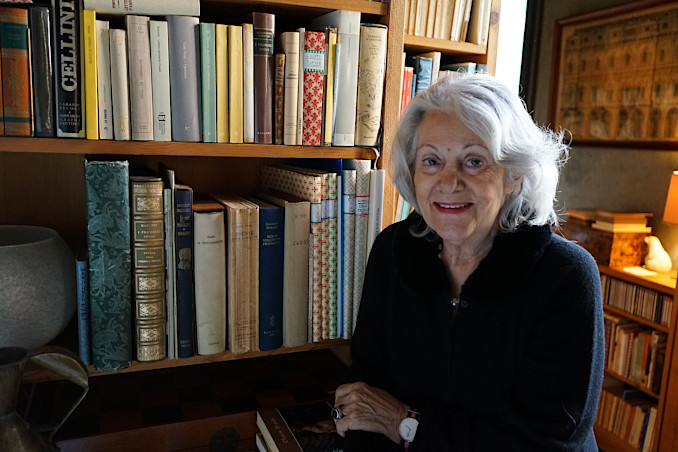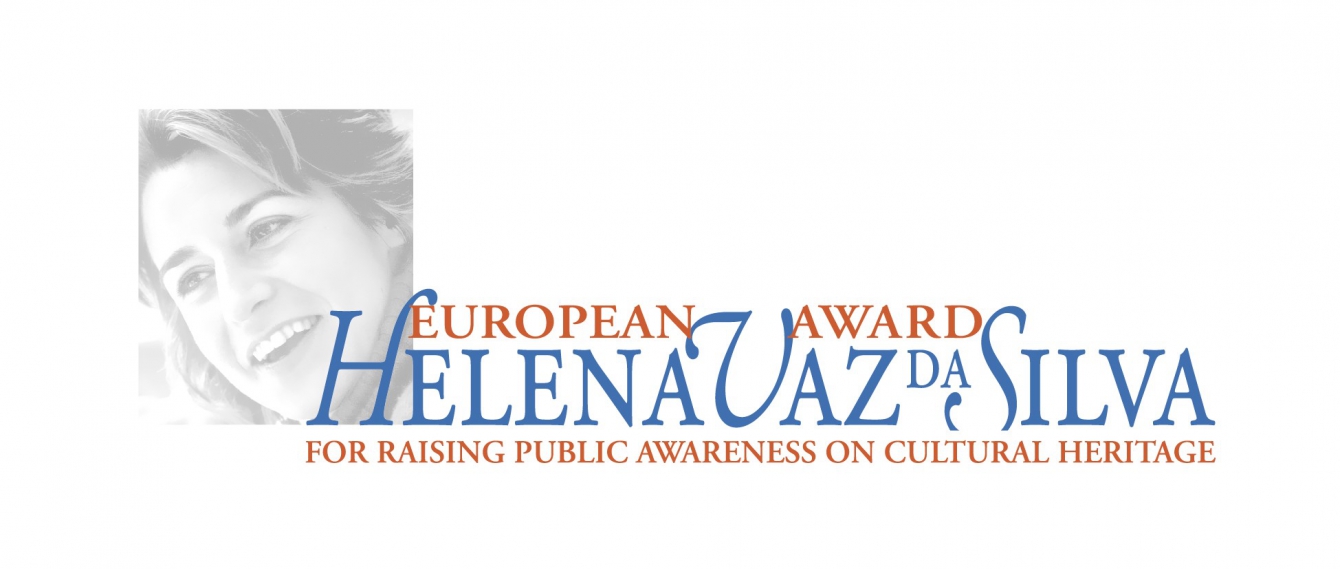Anne Teresa De Keersmaeker, contemporary dance choreographer from Belgium, wins Helena Vaz da Silva European Award 2021
Full Press Release: English │Portuguese
Anne Teresa De Keersmaeker, a leading European personality in contemporary dance, who is the founder of the dance company Rosas, has won the Helena Vaz da Silva European Award for Raising Public Awareness of Cultural Heritage 2021. This high European recognition pays tribute to Anne Teresa De Keersmaeker’s exceptional art of communicating European culture and values through dance. The Award Ceremony will take place on 8 November at the Calouste Gulbenkian Foundation in Lisbon.

© Johan Jacobs
The Helena Vaz da Silva European Award was established in 2013 by Europa Nostra and its country representation in Portugal, Centro Nacional de Cultura, in cooperation with the Clube Português de Imprensa.
The Jury of the Award also gave its Special Recognition to Antonia Arslan, prolific Italian writer and academic of Armenian origin, taking into account her important role in defending Europe’s cultural heritage – tangible and intangible – through literature and her dedication to defending human and cultural rights, namely those of female writers.
Reacting to the news, Anne Teresa De Keersmaeker stated: “I would like to thank the Jury for granting me the Helena Vaz da Silva European Award for Raising Public Awareness of Cultural Heritage. The honour is wholly mine, and pinpoints the profound debts I have accumulated to the European cultural scene in general and to Lisbon and Portugal in particular. These feelings of indebtedness are neatly summarised by this citation from Auden:
‘Dance, dance, for the figure is easy
The tune is catching and will not stop
Dance till the stars come down from the rafters
Dance, dance, dance till you drop’.”
The Jury of the Helena Vaz da Silva European Award emphasised: “The contribution of Anne Teresa de Keersmaeker to the celebration of Europe’s cultural heritage is manifold: firstly, because she is a widely and highly acclaimed interpreter of Europe’s dance and ballet traditions; secondly, because most of her performances have been inspired by and staged in Europe; thirdly, because the choice of her long-lasting base in Brussels is strongly influenced by the European and multicultural character of this city. For many lovers of ballet and dance, De Keersmaeker has undoubtedly become a leading icon of the European cultural scene, strongly inspired by Europe’s heritage and musical traditions. Last but not least, she has succeeded in spreading this authentic dance vocabulary in large parts of the Americas and Asia.”
The Jury, presided by Maria Calado, President of the Centro Nacional de Cultura, is composed of independent experts in the fields of culture, heritage and communication from various European countries: Francisco Pinto Balsemão (Portugal), Chairman of the media group Impresa, Piet Jaspaert (Belgium), Vice-President of Europa Nostra, João David Nunes (Portugal), Vice-President of the Clube Português de Imprensa, Guilherme d’Oliveira Martins (Portugal), Trustee of the Calouste Gulbenkian Foundation, Irina Subotić (Serbia), President of Europa Nostra Serbia, and Marianne Ytterdal (Norway), Council Member of Europa Nostra.
In 1980, after studying dance at Mudra School in Brussels and Tisch School of the Arts in New York, Anne Teresa De Keersmaeker (b. 1960) created Asch, her first choreographic work. Two years later came the premiere of Fase, Four Movements to the Music of Steve Reich. De Keersmaeker established the dance company Rosas in Brussels in 1983, while creating the work Rosas danst Rosas. Following these breakthrough pieces, her choreography has been grounded in a rigorous and prolific exploration of the relationship between dance and music. She has created with Rosas a wide-ranging body of work engaging the musical structures and scores of several periods, from early music to contemporary and popular idioms. Her choreographic language and practice also draw inspiration from geometry, numerical patterns, the natural world and social structures to offer a unique perspective on the body’s articulation in space and time. Her newest creations are a large ensemble piece set to Bach’s six Brandenburg Concertos and a solo set to the same composer’s Goldberg Variations. In 2020, she created a new choreography for the musical West Side Story on Broadway and started working on Dark Red, a series of choreographies designed for the museum space.
From 1992 until 2007, Rosas was in residence in the Brussels opera house De Munt/La Monnaie. During this period, De Keersmaeker directed a number of operas and large ensemble pieces that have since been performed by repertoire companies worldwide. In 1995 De Keersmaeker established the school P.A.R.T.S. (Performing Arts Research and Training Studios) in Brussels in association with De Munt/La Monnaie. Anne Teresa De Keersmaeker received numerous honorary titles, amongst others the title of Baroness of the King of Belgium in 1996 and of Officier de l’Ordre des Arts et des Lettres of the French Republic in 2000. She has also received many international prizes for her work, including the Medalha de Ouro da Cidade de Lisboa (Lisbon City Gold Medal) in 2012, the Medal for Merit to Culture from the Portuguese government in 2014 and the Venice Biennale Golden Lion for Lifetime Achievement in 2015.

© Tempi
The Jury of the Award also decided to give its Special Recognition to Antonia Arslan. “She has been a champion of Europe’s cultural heritage – tangible and intangible – for nearly 60 years: promoting European literature, defending Italian female writers, and also defending the culture and the memory of the Armenian people. She has toured the world lecturing not just on her scientific works or literary novels, nor just on human and cultural rights violations affecting her country of origin, Armenia, but on the vital broader reasons why Europe’s culture must be defended. To sum up, Antonia Arslan has spoken to and been read by millions of people throughout the globe about the precious values of Europe’s cultural heritage. Her inspiring and engaging work has had an immense impact on the people in Italy, elsewhere in Europe, and across the world.”
About the Helena Vaz da Silva European Award
 The European Award for Raising Public Awareness on Cultural Heritage is named after Helena Vaz da Silva (1939-2002), Portuguese journalist, writer, cultural activist and politician, in memory and recognition of her remarkable contribution to the promotion of cultural heritage and European ideals. It is presented annually to a European citizen whose career has been distinguished by activities that disseminate, defend and promote Europe’s cultural heritage, in particular through literary or musical works, news items, articles, chronicles, photographs, cartoons, documentary features, films, and radio and/or television programmes.
The European Award for Raising Public Awareness on Cultural Heritage is named after Helena Vaz da Silva (1939-2002), Portuguese journalist, writer, cultural activist and politician, in memory and recognition of her remarkable contribution to the promotion of cultural heritage and European ideals. It is presented annually to a European citizen whose career has been distinguished by activities that disseminate, defend and promote Europe’s cultural heritage, in particular through literary or musical works, news items, articles, chronicles, photographs, cartoons, documentary features, films, and radio and/or television programmes.
The Award has the support of the Portuguese Ministry of Culture, the Calouste Gulbenkian Foundation and Turismo de Portugal.
The previous laureates of this Award are the Italian writer Claudio Magris (2013), the Turkish writer and Nobel Prize laureate Orhan Pamuk (2014), the Spanish musician and conductor Maestro Jordi Savall (2015), the French editorial cartoonist Jean Plantureux, known as Plantu, the Portuguese philosopher Eduardo Lourenço (ex aequo, 2016), the German film director Wim Wenders (2017), the British historian and broadcaster Bettany Hughes (2018), the Italian Physicist Fabiola Gianotti (2019) and the Portuguese poet and Librarian of the Vatican Library José Tolentino Mendonça (2020).
Europa Nostra
Joana Pinheiro, Communications Coordinator
jp@europanostra.org
+31 6 34 36 59 85
Centro Nacional de Cultura
Teresa Tamen, Diretora-Geral de Atividades
ttamen@cnc.pt
+351 21 346 67 22






